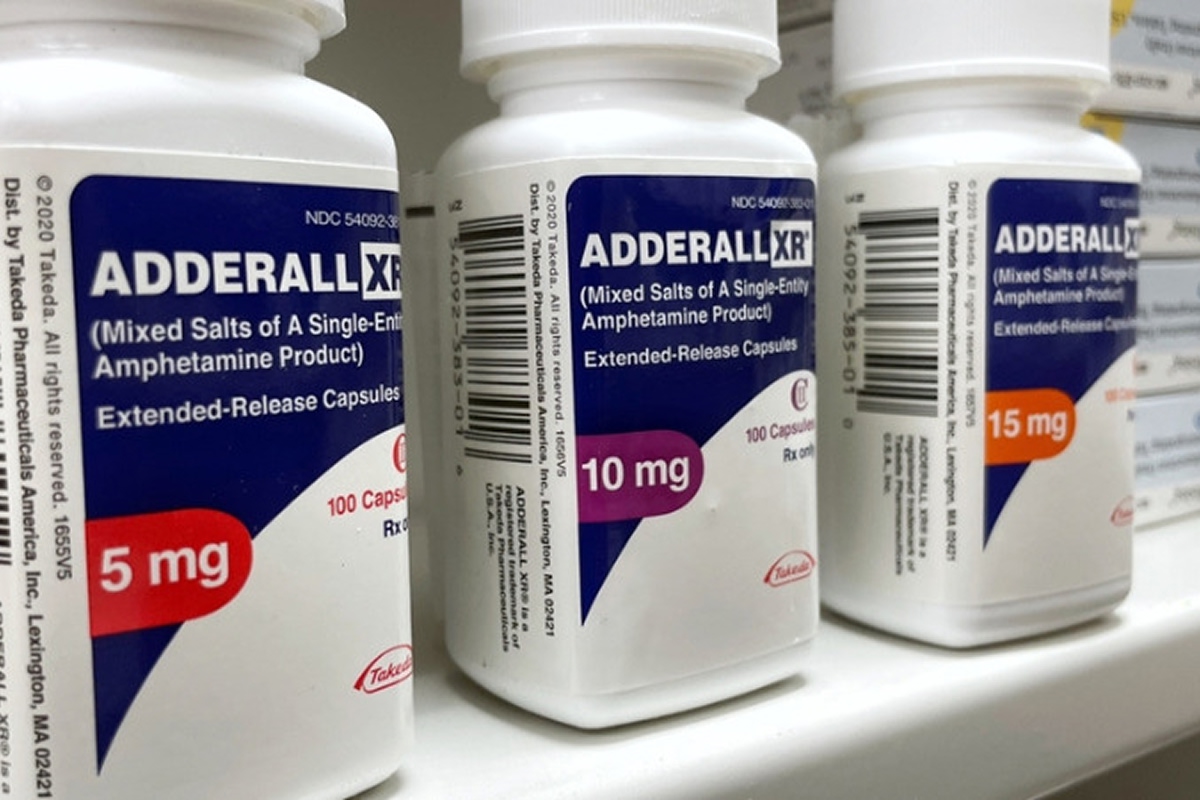Key Takeaways
- Adderall addiction vs. Adderall dependence involves psychological vs. physical components, but both require professional treatment.
- Adderall misuse carries serious health risks, including cardiovascular problems and mental health decline.
- 12 South Recovery provides integrated care combining detox, therapy, and holistic approaches for recovery.
When Prescription Becomes a Problem
For many, Adderall begins as a helpful prescription for ADHD or narcolepsy. But over time, what starts as medical treatment can shift into prescription drug abuse. As tolerance builds, the brain begins to crave higher doses, and what was once safe use can turn into dependency or addiction. Understanding this shift begins with knowing exactly what Adderall is and how it works.

What is Adderall
Adderall is a prescription stimulant medication that combines two active compounds: amphetamine and dextroamphetamine. Both act on the central nervous system, increasing levels of dopamine and norepinephrine. This effect enhances attention, focus, and alertness, which is why the drug is prescribed for ADHD and narcolepsy.
In individuals with ADHD, Adderall helps regulate hyperactivity and improve executive function. In those without the condition, the drug creates a surge of dopamine that can feel euphoric. This difference explains why misuse and stimulant abuse are common among people who seek enhanced performance, energy, or weight loss.
Adderall is classified as a Schedule II controlled substance, which means it has recognized medical use but also a high potential for abuse and dependence.
What is Adderall Addiction
Adderall addiction occurs when a person compulsively seeks and uses the drug despite harmful consequences. It is characterized by cravings, loss of control over use, and continuing despite negative impacts on health, relationships, or work.
Adderall addiction side effects include:
- Severe anxiety and paranoia
- Sleep disturbances and insomnia
- Elevated heart rate and blood pressure
- Aggression or irritability
- Risk of psychosis with high doses
Addiction changes the brain’s reward system, making recovery without structured treatment extremely difficult.
What is Adderall Dependence
Adderall dependence develops when the body adapts to regular use of the drug. Dependence is physical in nature, meaning the person experiences withdrawal if they stop taking Adderall abruptly.
Signs of dependence include:
- Needing higher doses to achieve the same effect
- Feeling unable to focus or function without Adderall
- Withdrawal symptoms such as fatigue, depression, and cravings
Dependence can occur even when Adderall is used as prescribed, which is why medical monitoring is important for anyone taking stimulant medications long-term.
Adderall Addiction vs. Adderall Dependence
| Category | Adderall Addiction | Adderall Dependence |
| Definition | Compulsive use despite harmful effects | Physical reliance requiring continued use |
| Primary Cause | Psychological craving and misuse | Long-term use, even as prescribed |
| Physical vs. Psychological | Psychological condition driven by cravings and behaviors | Physical adaptation with tolerance and withdrawal |
| Symptoms | Cravings, loss of control, risky behaviors | Tolerance, withdrawal, needing higher doses |
| Consequences | Health, social, and occupational problems | Difficulty stopping without medical support |
| Treatment Approach | Therapy, detox, holistic recovery, family involvement | Medical detox, therapy, gradual dose reduction |
What is the Difference Between Adderall Addiction and Adderall Dependence
Although Adderall addiction and Adderall dependence are related, they are not the same. The distinction lies in how the drug affects the brain, body, and behavior.
Adderall dependence is primarily physical. It develops when the body adapts to the medication, creating tolerance and withdrawal symptoms. A person may not be misusing the drug but still feels unable to function without it.
- Adderall addiction is behavioral and psychological. It occurs when someone continues using Adderall compulsively, despite harmful consequences in their health, relationships, or work. Addiction often involves cravings, loss of control, and risky behaviors like doctor shopping or taking larger doses than prescribed.
Think of dependence as the body’s physical adjustment to the drug, while addiction is the ongoing cycle of misuse and compulsive drug-seeking. Many individuals experience both at the same time, which makes professional treatment necessary.
At 12 South Recovery, we address both conditions through detox, therapy, and holistic care, ensuring that clients receive treatment for the physical dependence as well as the psychological patterns of addiction.
How Long Does it Take to Get Addicted to Adderall
The timeline for developing Adderall addiction varies. Some people misuse it for weeks before dependence forms, while others may take months. Factors include dosage, frequency, underlying mental health, and whether the drug is used with other substances. Misuse accelerates this process significantly.
Is Adderall Physically Addictive
Yes, Adderall is physically addictive. Once dependence sets in, the brain struggles to regulate dopamine naturally. This leads to withdrawal symptoms when the drug is not taken, such as exhaustion, low mood, or intense cravings.
How Does Adderall Affect Those Without ADHD
For individuals without ADHD, Adderall misuse produces an artificial surge of dopamine. Instead of balancing focus, the drug overstimulates the brain, leading to euphoria, hyperfocus, or extended wakefulness. These effects make it a target for academic or work-related abuse but also increase the risk of stimulant addiction and long-term damage.
Adderall Addiction Side Effects
Short-term effects:
- Insomnia and loss of appetite
- Restlessness and nervousness
- Dry mouth and digestive issues
Long-term effects:
- High blood pressure and risk of heart disease
- Depression, anxiety, and paranoia
- Risk of stroke or sudden cardiac events
- Malnutrition and weight loss
How to Treat Adderall Addiction
Treatment for Adderall addiction addresses both the physical and psychological aspects of misuse. At 12 South Recovery, we provide:
- Medical detox for safe withdrawal management
- Therapies such as CBT and DBT to address triggers
- Holistic practices like mindfulness, yoga, and nutrition support
- Family therapy to rebuild trust and strengthen recovery networks
Recovery is possible with structured care that targets both addiction and dependence.
Take the First Step Toward Healing
Adderall addiction and Adderall dependence may look similar, but both require support and care. At 12 South Recovery, we specialize in helping individuals break free from stimulant misuse and rebuild healthy, fulfilling lives. Call 12 South Recovery Today!































